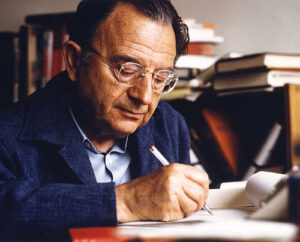
Erich Fromm (March 23-1900-March 18, 1980) was born in Frankfurt am Main to Naphtali Fromm and his wife Rosa Krause, who were Orthodox Jews. At age 18 he studied jurisprudence at the University of Frankfurt am Main, later transferring to the study of sociology at the University of Heidelberg, where his doctoral dissertation was “On Jewish Law.” Initially a Zionist, he turned away from it, saying it conflicted with his ideal of “universalist Messianism and Humanism” He trained to become a psychoanalyst at the sanatorium run by Frieda Reichmann, whom he married in 1926, separated from shortly afterwards, and divorced in 1942. In 1930, he completed his psychoanalytical training at the Frankfurt Institute for Social Research.
After the Nazis took over Germany, Fromm moved to Switzerland and then to New York, where he affiliated with Columbia University. In 1943, he helped to found a New York branch of the Washington School of Psychiatry, and three years later co-founded the William Alanson White Institute of Psychiatry, Psychoanalysis, and Psychology. He joined the faculty of Bennington College and the New School for Social Research in New York.
In the 1940s, he wrote Escape from Freedom, in which he posited that some people enjoy freedom while others wish to escape from it. Typical methods of escape are conformity, giving in to authoritarianism, and destructiveness. Another book written in the 1940s was Man for Himself: An Inquiry into the Psychology of Ethics. He listed four nonproductive character orientations, which he labeled “receptive,” “exploitative,” “hoarding,” and “marketing” and one positive orientation he called “productive.”
He wrote, “It is the paradox of human existence that man must simultaneously seek for closeness and for independence, for oneness with others and at the same time for the preservation of his uniqueness and particularity … the answer to this paradox – and to the moral problems of man – is productiveness.”
The two books were forerunners to his best known book, The Art of Loving, published in 1956. He said that when human beings became self-aware, realizing that though they lived in nature but were separate from it, they felt guilt and shame, which could only be mitigated by love. The love he extolled involved care, responsibility, respect, and knowledge.
In 1950, with his second wife, Henni Gurland, he moved to Mexico City because of her health problems, but she died two years later. In the interim Fromm became a professor at the Universidad Nacional Autonoma de Mexico (UNAM). Later in the 1950s, he became a professor at Michigan State University and an adjunct professor of psychology at New York University. In 1974, he moved with his third wife Annis Freeman to Muralto, Switzerland, where he died five days short of his 80th birthday in 1980.
Fromm joined the Socialist Party of America in the mid-1950s, and also militated against nuclear arms and US involvement in the Vietnam War. After Senator Eugene McCarthy (D-Minnesota) lost the Democratic presidential nomination in 1968 to Hubert Humphrey, Fromm withdrew from politics.
Next: March 24: Harry Houdini
*
SDJW condensation of articles in Wikipedia and New World Encyclopedia